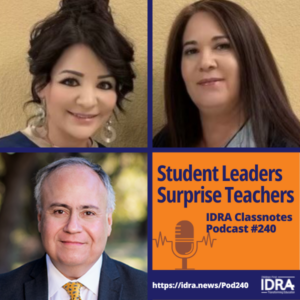 • By Hector Bojorquez • IDRA Newsletter • June-July 2024 •
• By Hector Bojorquez • IDRA Newsletter • June-July 2024 •
While student disengagement and absenteeism were problems before the pandemic, they have grown in the post-pandemic era. IDRA turned to our award-winning Valued Youth Partnership program and expanded elements to form our new Youth Leadership Now program with dramatic results.
“It blows your mind. It really does. The immediate change in students was palpable,” remarked Anna Luna, who is the teacher coordinator for the project at Fabens Middle School.
IDRA’s Youth Leadership Now is a field-initiated research-based project funded by the U.S. Department of Education. We are collaborating with the Education Service Center Region 19 to operate the program in several high-need school districts in West Texas.
We embarked on this inaugural year with a clear mission: to enhance the socio-emotional and academic skills of eighth-grade students who are at risk of dropping out of school. In 2023-24, over 50 students in Clint, Dell City and Fabens school districts participated in the Youth Leadership Now elective course. The experience improved their belief about their self-efficacy and sense of belonging as a basis for overall academic perseverance.
 IDRA designed the program, though, to also impact students schoolwide through their teachers. Beatriz Nuñez, also from Fabens, added, “Move that label aside. They are labeled as troublemakers. They are. But in YLN, you really get to see them in a different light. And they’re amazing kids.”
IDRA designed the program, though, to also impact students schoolwide through their teachers. Beatriz Nuñez, also from Fabens, added, “Move that label aside. They are labeled as troublemakers. They are. But in YLN, you really get to see them in a different light. And they’re amazing kids.”
This innovative initiative leverages IDRA’s flagship cross-age tutoring program, the Valued Youth Partnership, combined with teacher-led mentorship and community engagement through a variation of IDRA’s Education CAFÉ model.
Cross-Age Tutoring
In Youth Leadership Now, schools select eighth graders based on their need for academic support and leadership development opportunities, prioritizing students in at-risk situations. We then place them as tutors of three young elementary students.
Four times a week during school hours, the student tutors travel to the elementary school to work with their young charges (called “tutees”). With IDRA’s tutor guide, the tutoring sessions are interactive, incorporating games, reading activities, and problem-solving tasks aligned with the curriculum goals of the younger students.
On the fifth day of each week, tutors receive training on tutoring techniques, communication skills, college planning, and specific academic content areas, such as literacy and numeracy.
Mentorship Program
IDRA’s mentorship component provides robust support and guidance to the tutors as they transition from middle school to high school. This element successfully enhances the tutors’ leadership skills and academic persistence by connecting them with experienced mentors who facilitate their personal and academic development.
School leaders select mentors from a pool of experienced teachers known for their expertise in adolescent education and their ability to build strong, supportive relationships with students. IDRA and the service center provide monthly training sessions for mentors designed to equip them with the skills to support at-risk students effectively, including communication techniques, sensitivity to the socio-emotional needs of adolescents, and strategies for encouraging academic resilience and leadership.
“This innovative program leverages IDRA’s flagship Valued Youth Partnership cross-age tutoring program combined with teacher-led mentorship and community engagement through a variation of IDRA’s Education CAFÉ model.”
Mentoring sessions throughout the school year provide a platform for mentors to offer guidance, discuss academic progress, address personal or educational challenges the tutors face, and help them set goals and paths for their transition to high school.
The mentorship component includes continuous monitoring and support mechanisms to ensure the effectiveness of the mentor-tutee interactions. Mentoring sessions take place in designated quiet areas within the school, such as counseling offices or private corners of the library, to ensure privacy and foster open communication.
During this pilot year, mentors provided ongoing support and guidance tailored to each tutor’s individual needs, serving as role models, advocates and advisors. Tutors engaged actively with their mentors, participating in discussions about their experiences, academic challenges and plans for the future.
The expected outcomes for mentors include enhanced mentorship skills, a better understanding of the challenges faced by students who are deemed at-risk, and the satisfaction of contributing significantly to the development of future leaders. For tutors, the program aims to strengthen their leadership skills, improve academic performance, enhance self-esteem, and better prepare them for the transition into high school with a strong support system.
Youth Education CAFE™ Action Projects
Drawing from IDRA’s successful Education CAFE (Community Action Forums for Excellence) model, the Youth Education CAFE component of Youth Leadership Now also fosters intergenerational leadership and active community involvement in education issues. Youth Leadership Now engages students, families and educators in collaborative projects that address local educational challenges and promote equity.
A key topic was the minimal communication with families by the school and complicated tools for families to connect with their schools. Other topics included college affordability and school safety.
We convened students, their families, and educators, with special attention to include a diverse cross-section of the community to ensure multiple perspectives were represented in tackling educational issues.
IDRA provided training on the principles of community action research, including methods for identifying issues, collecting data and developing actionable strategies. We designed training sessions to be participatory and to provide tools for effective advocacy and project implementation.
Schools held regular Youth Education CAFE meetings as platforms for discussing, planning and implementing community-based projects. These meetings facilitated open dialogue among students, parents, educators and community leaders, fostering a collaborative environment. A key topic was the minimal communication with families by the school and complicated tools for families to connect with their schools. Other topics included college affordability and school safety.
The expected outcomes for the community include more robust relationships between schools and their communities, and actionable plans developed to address local educational challenges.
Looking Ahead
During this pilot year, Youth Leadership Now has shown promising immediate outcomes and laid a solid foundation for the program’s expansion across multiple districts.
The program is poised to broaden its reach and deepen its impact, building on the successes and lessons learned during this foundational year. We remain committed to transforming the educational trajectories of students deemed at risk through innovative, research-based interventions that lead students to become engaged, informed and thoughtful leaders.
Hector Bojorquez is IDRA’s director of operations and educational practice. Comments and questions may be directed to him at hector.bojorquez@idra.org.
[© 2024, IDRA. This article originally appeared in the May edition of the IDRA Newsletter. Permission to reproduce this article is granted provided the article is reprinted in its entirety and proper credit is given to IDRA and the author.]


